Interview With Cast (Vietnam, Cambodia, Myanmar)
![]() VIETNAM
VIETNAM
MAI LIEN
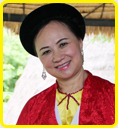
I was born in Thanh Hoa, in Vietnam.
I didn't become heavily involved in music until I was 14 years old. In 1967, auditions were held at schools around the country, and this allowed me to enter the Vietnam School of Music (which became today Vietnam National Academy of Music), where I studied dan tam thap luc, a 36-string dulcimer, for 4 years.
From graduation in 1971 until 1972, my role was to entertain the troops, for which I travelled around the country. From 1975 onwards, once the Vietnam War was over, I started to perform in concerts held overseas as well.
I met my husband, Ba Pho, at my graduation ceremony in 1971.
He had come to see the graduation concert, and apparently he knew when he saw me that I was the woman he was going to marry. It was love at first sight for me, too.
Ba Pho is a wonderful musician.
During the war, he too travelled the country to entertain the troops, and this prompted him to begin studying the music and the instruments of ethnic groups in Vietnam, as well as how that music was performed.
In 1976, we began a project to improve the t'rung, a xylophone-like instrument made from bamboo.
The project was intended to improve the t'rung, an instrument from the Tay Nguyen (Central Highlands) region, so that different types of musical pieces could be performed on it. Ba Pho made many adjustments to the instrument to make it possible for me to play it.
In 1985 our project was presented with an award for achievements by the national government.
Thanks to Ba Pho's efforts, the t'rung is now one of Vietnam's most recognizable instruments.
Alongside my activities with Ba Pho, I became a member of the Vietnamese National Song & Dance Ensemble. We performed overseas, travelling to Cuba in 1978, to Japan for a two month tour in 1979, and to Italy in 1982.
I have a son called Ba Nha. He was born in 1976, and he is named after a Chinese musician from the Warring States period (403-221 BC). It was chosen so that Ba Nha might grow up into a talented musician.
My son began studying music when he was three. Today, he is a professional musician and also a researcher of ethnic music.
The sort of work that we continue to undertake as a family is practical efforts focused on the preservation of the traditional music of various ethnic groups in Vietnam and we do not receive any financial support from the national government.
But somehow, over the years, we have managed it on our own.
Today, still, when presented with a myriad of folk instruments, Ba Pho will try to work out why each instrument makes the sound it makes, and what adjustments he can make to improve that sound. He then uses those instruments in his own performances.
Traditional music in Vietnam today is certainly no longer widely embraced.
But our own personal interests have driven us to be involved in traditional music thus far, and we intend to continue in our attempts to preserve such music into the future, too.
(interview on July 29, 2013)
![]() VIETNAM
VIETNAM
MINH CHI
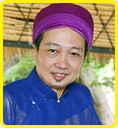
I was born in Hanoi, in Vietnam, in 1961.
My father was a stage director, and my mother was an actress in a type of musical theatre known as cheo.
In 1975, I too entered the world of cheo, and spending the next 38 years of my professional life in that same world.
As well as the music of cheo, I played music for performances of mua roi nuoc (water puppetry) and cai luong (modern folk opera), often travelling overseas with troupes for international performances.
I was a teenager when I first became professionally involved in theatrical music, and then I graduated from the Vietnam School of Drama & Cinematography.
When I think of the role of traditional music within Vietnam, I think the first thing to say is what an important contribution its makes education, which of course is vitally important to society.
Traditional music is perhaps not seen as so important in big cities, such as Hanoi, but in the countryside cheo is performed at school festivals, and actually has a very significant impact on education.
In Vietnam today there are 16 cheo troupes.
Our troupe has visited 16 countries, including Japan, France, the UK, Germany and Korea.
It is widely known that Vietnam is developing at a rapid pace. But the more developed we become as a country, the greater the risk to our musical traditions.
Yet still traditional performing arts are found in every country and culture. And so traditional performing arts are needed by the Vietnam of the future.
On a trip to Japan in 1988, I discovered the extent to which Japan treasured and protected its traditional performing arts, such as Noh and kabuki. Performances were even regularly broadcast on television.
In Vietnam, by contrast, we are lucky if even a single performance is broadcast over a month of television scheduling.
Traditional performing arts in Vietnam are also facing a difficult economic situation; it is hard to be optimistic for the future.
(interview on June 29, 2013)
![]() CAMBODIA
CAMBODIA
CHANNA
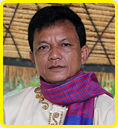
I was born in 1961, in Kandal Province in Cambodia.
Not everyone in my family was a musician, but my elder brother was a singer.
During the period of Lon Nol rule, in 1972, I entered a traditional dance school.
What followed was the era of the Khmer Rouge government, forcing us into slave-like conditions, so I was not able to graduate from school.
In August 1979, after Pol Pot and his followers were thrown out of Phnom Penh, few artists had survived the Khmer Rouge years, which meant I was automatically able to gain employment as a dancer and a drummer.
After beginning my career as a dancer, I was placed in charge of the department responsible for music within the national circus troupe, part of the Ministry of Culture and Fine Arts. I then took up a position teaching dance at the Royal University of Fine Arts.
Today, I am employed at the Ministry of Culture and Fine Arts. I am tasked with a significant role, namely the preservation, proliferation and promotion of the traditional performing arts of Cambodia.
Society in Cambodia is experiencing a period of great change.
The traditional performing arts that were once so integral to our lives are gradually being lost; I do not wish to see them disappear entirely. This is why I feel my work at the Ministry to be so vitally important.
The Cambodian government especially the Ministry of Culture and Fine Arts is also deeply committed to seeing traditional culture in Cambodia goes in the right direction. It runs a large number of projects and programs every year, the majority of which are extremely successful.
(interview on 27 June, 2013)
![]() CAMBODIA
CAMBODIA
VUTHA
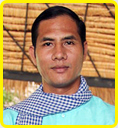
I was born in Phnom Penh, in Cambodia, in 1980, into a family of traditional musicians. Everyone in my immediate family, apart from my mother, is a traditional musician.
I specialize in the pinpeat style, but I can also play all other styles, whatever they might be.
I perform at religious events, and also play music for theatrical performances and court dances.
I was born into a musical family, so when I was around seven or eight years old, I started studying under my father.
After that, I studied performance at the Secondary School of Arts and the Royal University of Fine Arts. At school and university, my studies encompassed Western music as well as the traditional music of Cambodia.
In 2004, I graduated from university, and in 2007 joined the Ministry of Culture and Fine Arts, taking up a role in which I continue to perform as a musician.
The work of the Ministry of Culture and Fine Arts has given me the opportunity to play alongside wonderful musicians and artists from around the world.
(June 27, 2013)
![]() MYANMAR
MYANMAR
ACADAMY MYANMARPYI KYAUK SEIN
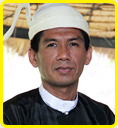
I was born in Yangon, on 10 September, 1972.
My father died when I was young, and after his death my grandfather was like a father to me.
My grandfather was a very talented comedian. My uncle was a musician in a hsaing waing ensemble. So our family was very much involved in the performing arts.
My mother, however, was from a farming family; she had no family connection to the arts.
I loved music ever since I was young; I only needed to listen to a song on the radio once to memorize it and start singing it myself.
When I was 6, I saw a traditional drum ensemble perform. That was it for me, I had to start learning music. So I began to learn the pattalar, a type of xylophone.
I still yearned, however, to study hsaing waing, the ultimate musical ensemble, and I was constantly practicing, my fingers tapping away on the desk at school.
As I have already mentioned, my uncle was a member of a hsaing waing ensemble, and when I was nine, and had grown strong enough, I began to study hsaing waing.
Whenever there was a school holiday, if my uncle was touring I would travel with him.
My uncle was a very strict teacher. He was impatient and quick to strike.
My grandfather, however, took pity on me, since I was still so young; he told me to give up hsaing waing and instead take up dance. But however hard and however often I was struck, my love for hsaing waing never once wavered. So I stuck with my uncle and learned everything I could from him.
When I was young, you had to learn each of the instruments in the ensemble in turn if you were to become a hsaing waing musician, so it was a long and hard road to completing your training. It’s different today.
Once I had completed my training, I moved to Sit Kwin. At that time, my grandfather gave me a wonderful gift: a hand-crafted set of hsaing waing instruments. I was overjoyed.
My grandfather was a very kind man; he bought me many instruments over the years, albeit little by little. He seemed to understand just how much I loved music, so he never told me to aim to become a hsaing waing musician. Instead, he always encouraged me to become a great hsaing waing musician.
In 1984, I returned to Yangon, to become the assistant of a musician called Sein Ba Maw, and spent several years training under him. In 1992, I was given my current professional name: Myanmarpyi Kyauk Sein.
In 1998, I established my own ensemble, and since then we have won the gold medal at the national hsaing waing contest 11 times. We have also recorded CDs, something which most hsaing waing ensembles have not done in the past. I am privileged to be living a life filled with music.
Today, I am a judge of the national contest, and I have also taken up the position of musical director for the Southeast Asian Games, to be held in Myanmar in 2013. I am an enthusiastic participant in national events.
As well as performing live at many different events and venues, I keep myself busying by working with singers to record CDs and by scoring music for film. In 2010, a film I scored won the equivalent of an Academy Award in Myanmar.
I am always conscious of tradition. But I think of myself as more than a musician; I have never defined what I do within the framework of what a performer of traditional music should do.
The traditions of Myanmar are incredibly important to its people.
But as the world becomes more globalized, those of us charged with preserving tradition must do so with an open mind and a progressive spirit.
(interview on June 26, 2013)
![]() MYANMAR
MYANMAR
BO THU RAIN
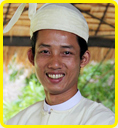
I was born in Kauak Hmuu, a farming village outside Yangon, on March 7, 1986. I come from a family of farmers; we had no existing connection with music.
Despite this, I joined a small drumming group in my village. I loved music.
When I was around 12 years old-and I can't remember this exactly-I saw either my current teacher, Kyauk Sein or my previous teacher, Sein Ba Maw, perform at the funeral for our local Buddhist priest. I was absolutely enthralled. I wanted to do what he was doing-to play how he was playing. So, in 1999, I left Yangon to enter the School of Fine Arts. I graduated in 2002, and immediately began studying under Sein Ba Maw.
Between 2002 and 2010 I worked as Sein Ba Maw's assistant, playing in his music troupe.
Sein Ba Maw then instructed me to study under Kyauk Sein, for whom I am now I am working as an assistant.
Sein Ba Maw was clearly thinking of my future as a professional musician when he recommended Chao Sein to me; Kyauk Sein has vast experience in working as a music director and also in music for the film industry.
Today, traditional music of Myanmar has been integrated successfully with modern music.
Against this backdrop, and in the context of the situation in Myanmar today, I believe that our generation are tasked with protecting the essence of traditional music, even as that music develops.
For example, there are some hsaing waing performers who are so intent on modernization that they are losing sight of the importance of tradition. I do not want to see our precious traditions lost. I do not want to see them changed. I do not want to see our traditions changed and it is in this sense that I wish to become a true performer of traditional music.
I have been lucky to already have been approached by four or five producers who have suggested that I establish my own independent music troupe. However, I do not yet consider myself to be at the stage where I can or should lead a troupe. There is still so much I have to learn from Kyauk Sein and so much more I need to improve in myself as a protector of the traditional music of my country.
(interview on July 1, 2013)
[Contact Us]
The Japan Foundation
Arts and Culture Department, Asia and Oceania Section
Person in charge: Genda (Mr.)/Matsunaga (Mr.)
Tel: +81-(0)3-5369-6062
- What We Do Top
- Arts and Cultural Exchange [Culture]
- Japanese-Language Education Overseas [Language]
- Japanese-Language Education Overseas [Language] Top
- Learn Japanese-language
- Teach Japanese-language
- Take Japanese-Language Test
- Know about Japanese-language education abroad
- The Japanese-Language Institute, Urawa
- The Japanese-Language Institute, Kansai
- Japanese-Language Programs for Foreign Specified Skilled Worker Candidates
- Japanese Language Education for Japanese Children Resident Overseas and for the Descendants of Migrants
- Archives
- Japanese Studies and Global Partnerships [Dialogue]
- JF digital collection
- Other Programs / Programs to Commemorate Exchange Year
- Awards and Prizes
- Publications
